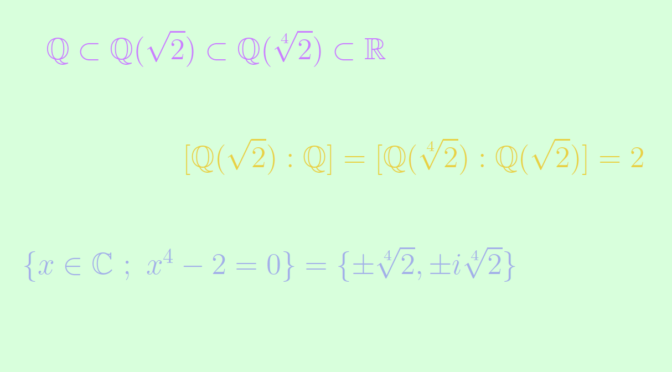An algebraic field extension \(K \subset L\) is said to be normal if every irreducible polynomial, either has no root in \(L\) or splits into linear factors in \(L\).
One can prove that if \(L\) is a normal extension of \(K\) and if \(E\) is an intermediate extension (i.e., \(K \subset E \subset L\)), then \(L\) is a normal extension of \(E\).
However a normal extension of a normal extension may not be normal and the extensions \(\mathbb Q \subset \mathbb Q(\sqrt{2}) \subset \mathbb Q(\sqrt[4]{2})\) provide a counterexample. Let’s prove it.
As a short lemma, we prove that a quadratic extension \(k \subset K\) , i.e. an extension of degree two is normal. Suppose that \(P\) is an irreducible polynomial of \(k[x]\) with a root \(a \in K\). If \(a \in k\) then the degree of \(P\) is equal to \(1\) and we’re done. Otherwise \((1, a)\) is a basis of \(K\) over \(k\) and there exist \(\lambda, \mu \in k\) such that \(a^2 = \lambda a +\mu\). As \(a \notin k\), \(Q(x)= x^2 – \lambda x -\mu\) is the minimal polynomial of \(a\) over \(k\). As \(P\) is supposed to be irreducible, we get \(Q = P\). And we can conclude as \[
Q(x) = (x-a)(x- \lambda +a).\]
The entensions \(\mathbb Q \subset \mathbb Q(\sqrt{2})\) and \(\mathbb Q(\sqrt{2}) \subset \mathbb Q(\sqrt[4]{2})\) are quadratic, hence normal according to previous lemma and \(\sqrt[4]{2}\) is a root of the polynomial \(P(x)= x^4-2\) of \(\mathbb Q[x]\). According to Eisenstein’s criterion \(P\) is irreducible over \(\mathbb Q\). However \(\mathbb Q(\sqrt[4]{2}) \subset \mathbb R\) while the roots of \(P\) are \(\pm \sqrt[4]{2}, \pm i \sqrt[4]{2}\) and therefore not all real. We can conclude that \(\mathbb Q \subset \mathbb Q(\sqrt[4]{2})\) is not normal.

